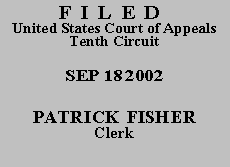

| UNITED STATES OF AMERICA,
Plaintiff - Appellee, v. WILLIAM J. BUCKLEY, a/k/a BILLY JOE BUCKLEY, Defendant - Appellant. |
|
Defendant-appellant William J. Buckley, a federal inmate proceeding pro se, seeks to appeal the district court's order dismissing his 28 U.S.C. § 2255 motion. Because he has failed to make "a substantial showing of the denial of a constitutional right," 28 U.S.C. § 2253(c)(2), we deny his application for a certificate of appealability ("COA") and dismiss the appeal.
In 1999, Buckley was found guilty of bank robbery, but acquitted of assault on a federal officer. His conviction was affirmed on direct appeal. United States v. Buckley, No. 99-3161, 2000 WL 702481 (10th Cir. May 26, 2000). He then filed his § 2255 motion, claiming that his trial counsel has been constitutionally ineffective because he failed to seek a severance of the bank robbery charge from the assault charge and had failed to inform the trial court that Buckley wanted to testify on one count but remain silent on the other. The district court ruled that, even assuming there was any deficient performance by counsel, Buckley did not sufficiently demonstrate that any prejudice resulted. See Strickland v. Washington, 466 U.S. 668, 687 (1984). Buckley also claimed his counsel was ineffective for failing to advise him that (a) even if he was found not guilty on the assault charge, he could still be sentenced for that charge if found guilty of bank robbery, and (b) if he testified, he could be sentenced for obstructing justice. As to the former claim, the district court ruled that Buckley benefitted from being tried and acquitted of the assault charge and his sentence was properly enhanced for reckless endangerment during flight. As to the latter, it ruled that Buckley's sentence was properly enhanced for obstruction of justice because he committed perjury during his testimony and that Buckley was aware he could be penalized for perjury.
On appeal, Buckley contends the district court erred in (1) denying his motion to extend the one-year filing deadline under § 2255 so that he could obtain a copy of his trial transcripts; (2) failing to appoint counsel to represent him in the § 2255 proceeding; (3) failing to conduct an evidentiary hearing; (4) finding that he was not prejudiced by his counsel's alleged deficiencies; and (5) failing to provide him with a copy of the trial transcripts.
In order for Buckley to make a substantial showing of the denial of a constitutional right, he must demonstrate that "reasonable jurists could debate whether (or, for that matter, agree that) the petition should have been resolved in a different manner or that the issues presented were adequate to deserve encouragement to proceed further." Slack v. McDaniel, 529 U.S. 473, 484 (2000) (quotations omitted). Nothing in the facts, the record on appeal, or Buckley's application for COA or brief raises an issue which meets this standard. The circumstances recited in Buckley's motion for an extension of time were not sufficiently extraordinary to warrant equitable tolling. See Miller v. Marr, 141 F.3d 976, 978 (10th Cir. 1998). Buckley possessed no right to counsel in the prosecution of his § 2255 motion. See Pennsylvania v. Finley, 481 U.S. 551, 555 (1987). The motion, files and records of this case conclusively demonstrated that Buckley was not entitled to relief; thus, he was not entitled to an evidentiary hearing. See United States v. Kennedy, 225 F.3d 1187, 1197 (10th Cir. 2000), cert. denied, 532 U.S. 943 (2001). Buckley never requested a copy of his trial transcripts from the district court. Finally, his § 2255 motion failed to make a sufficient showing that, under Strickland, 466 U.S. at 687, his counsel's performance prejudiced him.
We DENY Buckley's request for a COA and DISMISS the appeal.
Entered for the Court
Circuit Judge
*. This order and judgment is not binding precedent, except under the doctrines of law of the case, res judicata, and collateral estoppel. The court generally disfavors the citation of orders and judgments; nevertheless, an order and judgment may be cited under the terms and conditions of 10th Cir. R. 36.3.